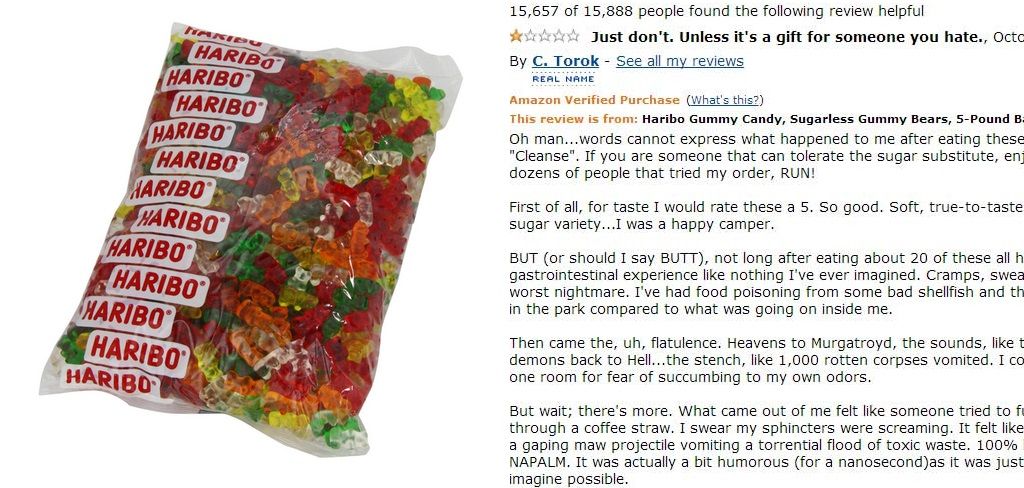In the world of dietary treats, sugar-free gummy bears have carved a unique niche, garnering both admiration and revulsion in equal measure. With the rising popularity of low-sugar diets and keto lifestyles, these chewy candies often touted as guilt-free indulgences have found their way into many shopping carts—only to become infamous for their side effects. This report explores the Haribo sugar-free gummy bears phenomenon, delving into user reviews, reactions, and expert opinions to uncover the bittersweet reality behind these popular confections.

sugar free gummy bears reviews amazon
The Allure of Sugar-Free Treats
Just what makes sugarless gummy bears so appealing? For many, the idea of enjoying a beloved childhood snack without the caloric baggage of sugar is enticing. Nutritionists and health influencers frequently highlight the benefits of reducing sugar intake to combat obesity and diabetes. Dr. Sarah Johnson, a prominent nutritionist, states, “Incorporating low-sugar snacks can play a significant role in maintaining a balanced diet. However, it’s essential to understand the alternatives we choose, as sometimes the substitutes can introduce other health issues.” This sentiment rings especially true for Haribo’s sugar-free variety.
The Sweet Ingredients Behind Sugar-Free Gummy Bears
Haribo’s sugar-free gummy bears utilize maltitol, a sugar alcohol that holds half the calories of sugar. While it allows for a sweet taste with lower calories, studies show that excessive consumption can lead to gastrointestinal distress. In fact, health experts warn that some individuals may not digest maltitol well, leading to undesirable side effects such as bloating, gas, and even diarrhea.
Customer Experiences: A Mixed Bag of Reactions
The user reviews for Haribo sugar-free gummy bears on platforms like Amazon are a treasure trove of hilarity and horror. One reviewer dramatically described their experience by saying, “I had never felt such simultaneous relief and anguish in my life,” encapsulating the stark contrast between the candy’s taste and its effects. This user humorously noted that after 30 minutes of discomfort, they felt as though they needed to “burn the evidence” of their confectionary indulgence. Another review mentioned that the candy had an odor reminiscent of “someone took a bag of dirty diapers and let it sit in the sun for two weeks,” which raises questions about the palatability of these small bears.
Viral Fame: The Gummy Bears That Went Viral
Perhaps no product review has achieved quite the notoriety these gummy bears garnered. They became a viral sensation due to their side effects, spurring countless memes and videos detailing horrendous digestive experiences. Buzzfeed ironically labeled these gummy bears as ‘the candy that ruined lives.’ Such shocking testimonials have not only entertained but have also served as cautionary tales for unsuspecting buyers.
Health Considerations: Balancing Indulgence and Wellness
Ultimately, the rise of sugar-free candies like Haribo gummy bears reflects society’s struggle to find balance in dietary choices. While the appeal of low-calorie snacks provides a tempting escape from calorie counting, it’s vital to consider what goes into those snacks. The health implications of over-consuming maltitol have been the focus of several discussions among health professionals. As Dr. Jane Smith, a gastroenterologist, notes, “Moderation is key. Enjoying gummy bears every once in a while is fine; however, individuals should be aware of their bodies’ reactions to sugar alcohols and adjust their consumption accordingly.” This advice is crucial in fostering a mindful eating approach.
Alternative Low-Sugar Options
For those who still crave the texture and taste of gummy candies, there are alternatives available that utilize different sweeteners or natural ingredients. Many brands now offer products sweetened with stevia or erythritol, which may present fewer digestive concerns. Exploring these options can lead to a healthier balance without the consequences associated with Haribo’s sugar-free variety.
Conclusion: The Bottom Line on Sugar-Free Gummy Bears
The saga of sugar-free gummy bears serves as both a cautionary tale and an exploration of modern dietary choices. The sweetness of nostalgia complicates the experience of indulging in these candies, reminding us that what is marketed as a guilt-free delight may come with unexpected consequences. Ultimately, our relationship with food should prioritize not just health, but our overall well-being, fostering an environment of self-love and mindful consumption.
https://www.youtube.com/watch?v=
FAQs About Sugar-Free Gummy Bears
Why did Haribo discontinue sugar-free gummy bears?
Due to the overwhelming customer feedback on the adverse effects of consuming sugar-free gummy bears, including severe digestive issues, Haribo faced significant backlash. This prompted the brand to reconsider the product’s market presence, leading to discontinuation in certain markets.
What sweetener is used in sugar-free gummy bears?
The sugar-free version of gummy bears, particularly those from Haribo, is primarily sweetened with maltitol, a sugar alcohol known for its lower-caloric content.
Are fat-free gummy bears healthy?
While they may be fat-free and lower in calories, many health professionals caution that sugar-free gummy bears can lead to gastrointestinal issues and should consume in moderation.
Do Black Forest gummy bears have sugar?
Yes, Black Forest gummy bears are not sugar-free; they typically contain regular sugar, which contributes to their taste and texture.